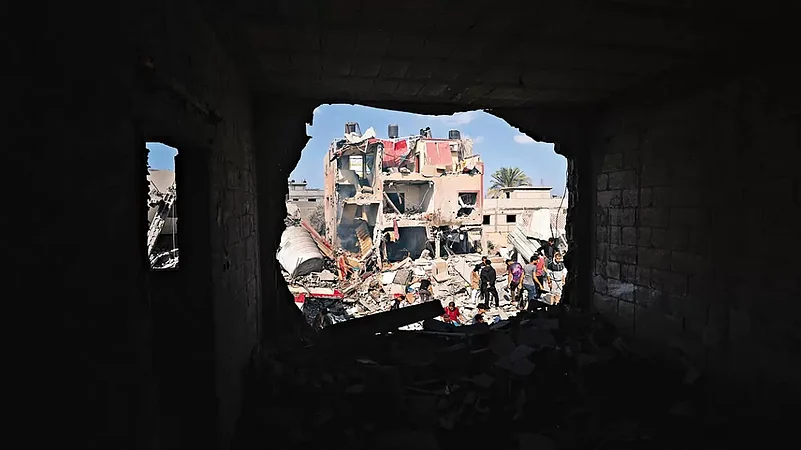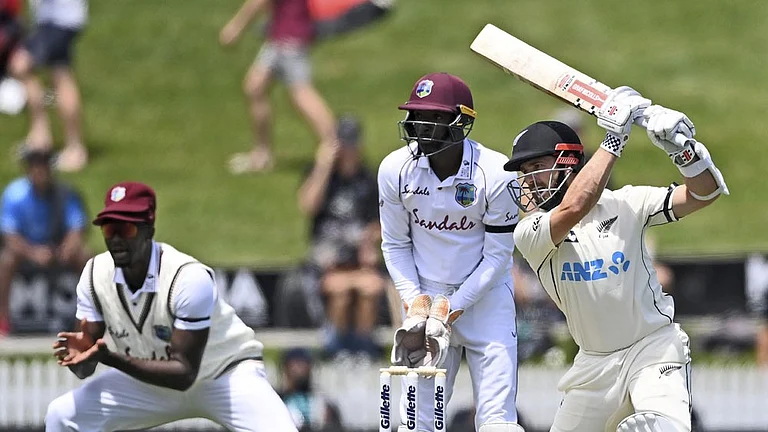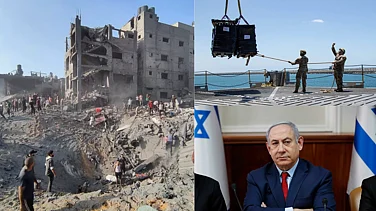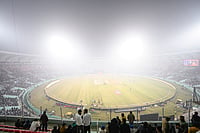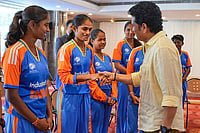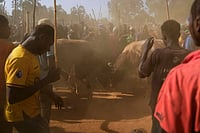In the fragmented reality of Palestine, the West Bank and the Gaza Strip stand isolated, their connection severed. From my home in Ramallah, which is only 37 miles from Gaza, the gap feels huge due to Israeli restrictions that make short distances insurmountable. My friend Huda Amer, a fellow journalist, and I endure this reality, with our connection limited to infrequent, intermittent phone calls amid the ongoing bombardment.
Huda’s family home in Gaza, a symbol of our shared dreams, was destroyed by an Israeli airstrike, separating us even more than before. Across the West Bank, countless families mourn the loss of their loved ones in Gaza and are overwhelmed by helplessness and guilt.
Amidst this turmoil, the story of newborn Kinan Sawarkah has had a profound impact. Born into the reverberations of war, Kinan was orphaned just three days after his birth after an Israeli airstrike killed his father Yousef and other relatives. Miraculously, Kinan and his mother Islam Jamal survived. This tragedy underscores the relentless struggle of Palestinians to protect their newborns in the midst of chaos.
Yousef’s memory lives on through a single photograph with Kinan, a poignant reminder of the fleeting father-son bond and the far-reaching, merciless conflict. This image, emblematic of the love extinguished in Gaza, illustrates the resilience of the enclave and the unspoken narratives.
The Gaza Strip and the West Bank are two Palestinian territories conquered by Israel in the 1967 Six-Day War. In total, over 5 million Palestinians live in the two territories.
The Gaza Strip is 140 sq km in size and is located in the southwestern corner of Israel on the Mediterranean coast. It also borders Egypt to the south.
The West Bank is another area that lies within Israel, but at 2,173 sq miles is much larger than the Gaza Strip. The West Bank stretches along the eastern border of Israel along the western bank of the Jordan River and most of the Dead Sea, hence the name. The holy city of Jerusalem is considered part of the West Bank under international law, with East Jerusalem claimed as the capital by both Israelis and Palestinians. There is no land connection between the two Palestinian territories unless you cross a maze of Israeli checkpoints and Israeli territory.
When I talk to my friends in Gaza they tell me harrowing stories. When you speak to them in the evening, it is not certain that they will still be alive in the morning or in an hour or another minute.
The Al-Shefa Medical Complex is a glaring example of the brutality of the siege. The medical staff must take on the burden of burying unidentified victims in the absence of their families. The ongoing conflict has transformed the Gaza Strip into a landscape characterised by unrecognised graves.
One fateful day, young Kinan Sawarkah, a Palestinian newborn, will find that his first breath coincided with the haunting echo of the war that shook his town and made him an orphan at just three days old.
In the enveloping darkness of the Gaza Strip, an Israeli warplane struck Kinan’s grandfather’s house, extinguishing the warmth of the family gathered there and ending the lives of his tender father Yousef Sawarkah and two other children of his relatives who had sought refuge with him.
By a miraculous twist of fate, Kinan and his mother survived the attack when they sought refuge in Islam’s father’s house after giving birth. Amidst the chaos of conflict, a Palestinian tradition remained that women were cared for by both their own family and their husband’s family during the delicate period after childbirth.
Despite the bitter reality that there was no truly safe place in the coastal enclave, these women, defying all odds, sought refuge wherever they could. In this desolate landscape, Palestinians, driven by an unwavering determination, continue their fight to protect the precious lives of newborn babies amidst the ravages of war.
The poignant bond of fatherhood between Yousef and his infant son Kinan was tragically torn apart, leaving only a single captured moment—a photograph of Yousef holding Kinan in his arms in the tender moments after his birth. This single image becomes the only visual memory of their time together, supplemented only by the countless stories collected by Kinan’s mother, grandparents, uncles and friends. Through these shared stories, the memory of Kinan’s beloved father lives on and transcends the boundaries of this one captured moment. It is not only a poignant remembrance of Yousef embracing Kinan after his birth, but also a poignant reflection on the general Israeli tendency to snuff out hearts full of love in Gaza. In the face of adversity, the enduring memory of this fleeting moment and the relentless assault on love itself is a stark reminder of the resilience and untold stories in the besieged enclave.
A heartbreaking reality unfolds in Gaza’s hospitals as they become the target of Israeli military attacks, both from the air and from the ground. The ongoing siege, combined with the prevention of medical aid and fuel, is putting dozens of premature births at risk. The incubators are unable to operate at full capacity, jeopardising the standards crucial to saving the lives of these vulnerable newborns. According to hospital officials, four of these premature babies were orphaned as the Israeli airstrikes killed their mothers and doctors performed an urgent cesarean section on the women killed to save the newborns’ lives.
On November 10, the Israeli army attacked the Al Rantisi Children’s Hospital, destroying its main gate and wards. The attacks disrupted the oxygen supply, leading to the tragic death of a patient in the intensive care unit. Dr Mustafa Al Kahlout, the director of the hospital, describes the grim situation, “The departments are now inactive, only the intensive care unit is operational, where eight patients are facing death at any moment. The hospital is facing major challenges as ambulances and even people outside the hospital are being targeted, exacerbating the already difficult circumstances.”
Reports from Gaza show a harrowing situation at Al-Shefa Medical Complex, where nearly 200 bodies are disintegrating due to the ongoing siege by Israeli tanks. In the absence of their families who are unaware of the losses, the medical staff say prayers and bury the unidentified people in the hospital’s courtyard. As a result of the war, the Gaza Strip is marked by numerous cemeteries for the unknown victims of war.
On the afternoon of November 14, it rained in Gaza, where the Israeli siege continues to prevent access to water, food, medicine and fuel to the densely populated enclave as collective punishment for Gaza residents.
Palestinian bloggers on social media shared a video of a child catching the rainwater in a pot, saying, “Praise be to God who provides us with water. He knows our suffering and our struggles and has sent us drinkable water.” The other tragic side of the rainy sky is the suffering of the hundreds of thousands of displaced people in Gaza who are now without shelter.
Relentless Israeli airstrikes since October 7 have completely destroyed 41,120 homes and partially destroyed 222,300, leaving more than one million Palestinians to spend the cold winter outdoors.
As the war and siege against the Palestinians have continued, numerous warnings have been issued by government agencies about the critical worsening of the humanitarian crisis and the high likelihood of the spread of disease among residents. In addition, Israel is using starvation as a war strategy against the civilian population. Palestinian writer Moumen Meqdad, who was displaced along with his sisters and their children, spends hours every day trying to find some bread for them. He says, “The problem is not financial; the frustration is that you are ready to drown everyone in money, but no one has flour and bread. Even yeast to bake bread is not available. There is no electricity for baking and no gas for cooking. People are dying of hunger.”
The people of Gaza are expressing their deep sorrow, the pain of losing everything, families, friends, memories and homes. But they still firmly believe in their right to resist the occupation to win their dignity and freedom, just like the other nations of the world.
Meqdad says, “We are human beings who experience pain and shed tears; every day we are torn apart by what we endure. We stand by the resistance until our last breath, it is our first and last line of defense.”
The Palestinian armed resistance continues its fight against the Israeli army on the ground, maltreating soldiers in Gaza City and the north of the country and firing rockets at Israeli towns—a normal response to the countless massacres in Gaza that hit civilians in their homes, on the streets and even in UN schools.
While Israel claims it is targeting Hamas because it attacked Israeli territory, Israeli forces have been regularly raiding the West Bank over the past many months, even before the Hamas attack. And there is no Hamas in the West Bank, but an internationally recognised Palestinian Authority governing the territory. At least 11 Palestinian communities have been completely abandoned since the beginning of the year, including six since October 7, according to the West Bank Protection Consortium, a group of non-governmental organisations funded by the European Union.
The United Nations has recorded 222 Jewish settler attacks backed by Israeli forces against Palestinians over the past month. Eight people, including a child, have been killed. Another 64 Palestinians have been injured, more than a quarter by live ammunition.
At least 1,100 Palestinians were forced to leave their communities between January and the first week of October. In just the past month, more than 900 people have fled. An estimated 3 million Palestinians live in the West Bank, alongside more than 500,000 settlers, whose numbers have increased by 16% over the past five years as US-led peace talks over a two-state solution to the Israeli-Palestinian conflict have collapsed.
Palestinians were already dying a slow death. After the Hamas attack, the only difference is that the world is now watching, live in their drawing rooms, the barbarity thrust on them.
(Views expressed are personal)
(This appeared in the print as 'A Testament To Resistance')
Salam AbuSharar is a Palestinian freelance journalist and researcher






